draft manuscript - Linguistics - University of California, Berkeley
draft manuscript - Linguistics - University of California, Berkeley
draft manuscript - Linguistics - University of California, Berkeley
Create successful ePaper yourself
Turn your PDF publications into a flip-book with our unique Google optimized e-Paper software.
clitic because it follows other morphemes previously analyzed as clitics (e.g., =mai) and because in<br />
modern Omagua it forms part <strong>of</strong> the phonological word.<br />
(2.41) eRa cristianokana Dios kumesamaipuRakana eRa amuyasukatataRakana eRas1mamaiwasu1ma,<br />
RanaumanuRaSi, makati Ranasawasuakana usu?<br />
eRa cristiano =kana Dios kumesa =mai =puRa =kana eRa<br />
good Christian =pl.ms God say =inact.nomz =nom.pst =pl.ms good<br />
amuyasukata -taRa =kana eRa -s1ma =mai =wasu =1ma<br />
observe -act.nomz =pl.ms good -core.neg =inact.nomz =aug =priv<br />
Rana= umanu =RaSi makati Rana= sawa -sua =kana usu<br />
3pl.ms= die =nass where 3pl.ms= soul -? =pl.ms go<br />
‘The good Christians, those who observe what God said, those without great evil, when they<br />
die, where do their souls go?<br />
(example (6.20a))<br />
The privative survives in modern Omagua, with an identical function, as in (2.42).<br />
(2.42) Modern Omagua<br />
yuká nIumai mui yak11mamai.<br />
yuká nI= umai mui yak1 =1ma =mai<br />
dem.dist.ms 2sg= look.at snake head =priv =inact.nomz<br />
‘Look at that snake without a head!’<br />
2.3.5 Interrogatives<br />
2.3.5.1 Polar Interrogatives<br />
Old Omagua polar interrogative sentences are surface-identical to declarative sentences with the<br />
exception that the clause is marked by either <strong>of</strong> the second-position clitics =tipa or =pa. 78 In most<br />
cases this results in one <strong>of</strong> the clitics attaching to a verb, because the verb phrase is most frequently<br />
the initial constituent in a given sentence. However, negative interrogatives and interrogative sentences<br />
with an initial adverb show an interrogative clitic on the negator or adverb, respectively.<br />
Example (2.43) shows =tipa attaching to an initial VP.<br />
(2.43) neyam1m1atipa upakatu nIĩyamukuikatu neutSakanapupe neyum1Rataikua yeneyaRa Dios?<br />
ne= yam1m1a =tipa upa =katu ne= ĩya =mukui =katu ne= utSa =kana<br />
2sg= grieve =interr all =intsf 2sg= heart =com =intsf 2sg= sin =pl.ms<br />
=pupe<br />
=instr<br />
ne=<br />
2sg=<br />
yum1Ra<br />
get.angry<br />
-ta<br />
-caus<br />
=ikua<br />
=reas<br />
yene=<br />
1pl.incl=<br />
yaRa<br />
master<br />
Dios<br />
God<br />
‘Do you grieve with all your heart because you have angered our Lord God with your sins?’<br />
(example (6.36a))<br />
Example (2.44)-(2.45) shows =tipa attaching to the negator and an initial adverb, respectively.<br />
(2.44) aikiaRa musap1R1ka personakana, Roayatipa musap1R1ka Dios?<br />
78 These clitics also occur on interrogative words in the Jesuit texts (see §2.3.5.2 and §9.4).<br />
35
















